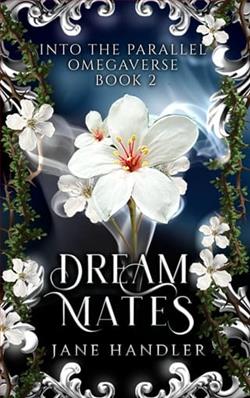Page 148 of The Surviving Sky
“Between me,” he replied, “and me.”
Ahilya nodded slowly. She had seen something in the vortex. Snatches of the vision returned to her, of formless air fragmenting into two; of a star-studded universe like Iravan dying; of another universe where she and Iravan had forged a wondrous labyrinth.
“I saw all that,” Ahilya said. “How?”
“I’m not sure,” he said, his voice heavy. “I don’t understand it all. But I think when you entered the vortex, you somehow linked with my Etherium.”
“Your…Etherium.”
“A third vision. Beyond the two split visions of trajection or the two expanded visions of Ecstasy. I think you have it too.”
Ahilya frowned, trying to picture what he meant. “The mind’s eye, you mean?”
“No, a different dimension that lies far beyond the mind’s eye. A place of guidance.” Iravan shook his head. “It’s difficult to explain. I don’t understand it myself.”
Ahilya closed her eyes. Images beckoned her, of Iravan’s glowing eyes, of the vortex, of the cave where they’d seen those carvings. Yet beyond that she discernedsomething, a presence that was watching her even as she watched it, focused and burning behind her brows. She had never once paid attention to it, but now that Iravan had pointed it out, she knew the presence had always been around her, within her.
“The other yakshas,” she said, opening her eyes, alarmed at sensing the Etherium. “Where are they?”
“Somewhere around the habitat. Or perhaps back into the jungle nowthat…”
“Now that we’ve ended the earthrage.”
“Yes.”
Ahilya shook her head. “I’ve spent my life studyingthem—andto know that they’ve been here allalong…so many of them.” Her breath came out in a shudder. “I suppose they are immortal.”
Iravan nodded solemnly. “In a way, yes. I have died and been born so many times, but the falcon has retained its shape and its memory. No matter the passage of time, it will always remember me.”
Ahilya swallowed. She had consideredit—theagelessness of the yakshas, the minute she had seen them snap from jungle creatures on the carvings. Yet the fact ofit—thefalcon resting behind her now, the elephant-yaksha she had tagged, all those creatures she had examined and studied soclosely…That they had all been around since the very firstearthrages…Awed tears filled her eyes. She couldn’t comprehend the enormity of this revelation. The yakshas were the most ancient creatures in the world. What she would not give to see the passage of life through their sight.
She turned to Iravan and squeezed his hand, but tiny glasslike tears shone in his blue-green eyes. “What is it?” she asked.
“The yakshas,” he said quietly. “They are immortal and they remember, but Ithink—Isuspect—wehave done great damage to many already.”
“How so?”
“Through excision,” Iravan said. “I can’t be sure, but I think that’s what excision does. It cuts an architect away from their yaksha, from the source of their connection to trajection and Ecstasy, and from their Nakshar’s Constant. I imagine it drives the creatureinsane—perhapseven makes it mortal somehow. Perhaps the yaksha forgets its architect, the same way an architect no longer can perceive the Constant.” He took a deep, ragged breath, as though struggling with a great burden, then stilled again.
Ahilya did not speak. What could she say? Iravan had felt guilty about excising Manav before, but now, when he knew the whole truth of his action, an action he and the others had been forced to do through generations of lies? Her own history had been erased, but for Iravan to learn ofhishistorynow—theshame and consequence ofit—nothingshe said could alleviate his guilt.
He seemed to be following the same line of thought. When he spoke, his voice was calm, though she could still detect an undercurrent of fury. “Architects are taught about earthrages,” he said. “They learn that earthrages are caused by a disruption of consciousness. But the true extent of thattheory…it is not fully known. If it were, it would devastate us.”
“You mean thatthing…that being,” Ahilya said softly. The Etherium had shown it to her as a formless wisp of air. She had felt its desperation in its attack. She had known desperation like that once. “It is not the yakshas that cause the earthrages like we’d thought.”
“No. It is a cosmic creature. I don’t have a term for it yet. For the kind of thingI…we…usedto be.”
His hand gripped hers. The other hand clenched into a fist on his knee. Behind them, the falcon ruffled its feathers and uttered a growl in its throat. Vibrations rippled through Ahilya like the aftershocks of an earthrage.
After a long moment, Iravan released his hold on her fingers. He smoothed his hand, caressing hers in apology.
“When a cosmic being like that splits,” he said, “the disruption to consciousness occurs at a planetary level. Those beings were connected to the planet in some intrinsic way. That is why we have trajection. Each time one of those creatures splits, an earthrage begins. And it only ends when they’re successful, when they embed their broken consciousnessin…in an available vessel. In humans who are subsequently born with the ability to traject,” he said pointing at himself. “And animals that snap to become yakshas.” He gestured at the falcon, which seemed to have gone back to sleep.
“You are implying that every earthrage we’ve ever had, a new architect was born in some ashram or another.”
“An architect born, and a yaksha formed. But given how wild creatures don’t exist in the jungleanymore…perhaps that’s something you can answer?”
Ahilya considered this. “Perhaps the yakshas formed in the most recent earthrages are not yakshas at all but something else altogether. I’d have to study the split to know how many forms the two halves of a being can take.”















